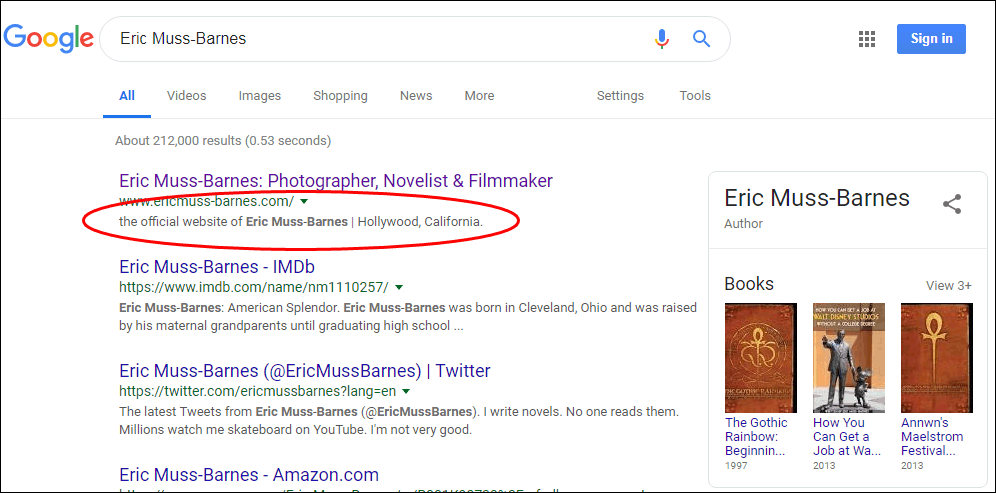Part 10 - Learning SEO for Beginners
Written by Eric Muss-Barnes, 13 December 2018What good is building a website, if no one can find it? Right?
How do you avoid the problem of building an obscure or unknown website?
How do you make sure people can locate your website?
I mentioned in a previous article that search engines are used to categorize websites. But how do you assure your site ranks higher than the rest? How do you ensure your information is considered more pertinent and relevant than your competition? How do you optimize a website, to get great search results?
By using great SEO practices.
The term "SEO" is an abbreviation for "Search Engine Optimization" and is a vital part of building a website. Being well-versed in SEO allows your websites to show up near the top of search engine results. In the process of learning to build a website, not many instructors would teach SEO practices as the second lesson. Why am I teaching SEO immediately? Because SEO is a bit of an "art and science" of understanding the ever-changing algorithms used by the major search engines to categorize and index websites. And frankly, like I said at the start, what good is building a website if no one can find it? That is why I want you to understand the term "SEO" during such an early phase of this series of articles.
There are countless factors and variables that go into good and proper SEO practices. I can't possibly teach all of the nuances to you. In fact, there are entire businesses dedicated to studying the best practices of SEO, and many companies hire these SEO experts, to assist in evolving their websites.
For the purposes of this lesson, I just want to cover the basic principals of SEO, by teaching you about a part of your HTML code called "metatags". Metatags appear at the very start of your webpage, inside of the HEAD tag. The HEAD tag goes after the HTML tag, but before the BODY tag. In order to explain metatags, let's use the metatags from this website as our example.
PART 10 - LESSON A - METATAGS
Among the many factors which go into good SEO practices are the way your code is physically arranged on the page, the file size of images, the use of proper headlines tags, having relevant content in the text of your page, and on and on. Remember, an entire industry is built around this knowledge, so I can't cover everything in this article. I just want you to understand why metatags are so vitally important to your website.
Search engines use specialized programs called "spiders", which go out and automatically scan millions of web pages, in order to catalog and track what appears on those pages. When you search for a website, the description of that site in the search results is pulled from the "description" metatag of that page, and the title of that site, is pulled from the title tag. This is the reason why title tags and descriptions are so incredibly important to articulate clearly on your website.
Like I said, there is a whole massive world to SEO. These lessons are incredibly basic and don't even begin to scratch the surface. But, if you want your websites to appear properly in searches, it's essential you understand the purpose and function of basic title tags and metatag descriptions. Below, you can see an example of the search results from my own personal webpage, where I have highlighted the description.

What happens if you do not use metatags?
The spiders will simply use the very first block of text they find to use as the description of your website. I once interviewed for a company who used no metatags whatsoever, so the description of their website read "Terms of Service | Privacy Policy", because that was the first text, way at the bottom of the page, the spider was able to read. I was actually very amused by the fact they didn't hire me, considering their current team of developers clearly had no understanding of the fundamentals of website design.
But, that is how it goes.
The world is filled with droves of ignorant people and I am here, humbly sharing my knowledge, so you will not be one of the Buffoons of the Internet. Thank you for putting forth the effort to learn something. Your desire to be enlightened is admirable in and of itself. Taking the time to question things, and to cease being uneducated, is important. Instead, you will be wise and educated and your will possess skills of worth.
And remember, kids, the world owes you nothing... until you create things of value.
Glossary
description
A metatag used to describe the content of a webpage. Used by spiders to post the description of your website in search engine results.metatag
Lines of code placed at the top of a webpage, so search engine spiders can better index and catalog a website.SEO
An abbreviation for "Search Engine Optimization". The art and science of building a webpage so it ranks high in search results on search engine websites.spiders
Programs that index and catalog websites for search engines.title tag
An HTML tag and metatag that gives a title to a webpage, used both in the top of the browser window and in search engine results.Downloads
Other Articles
